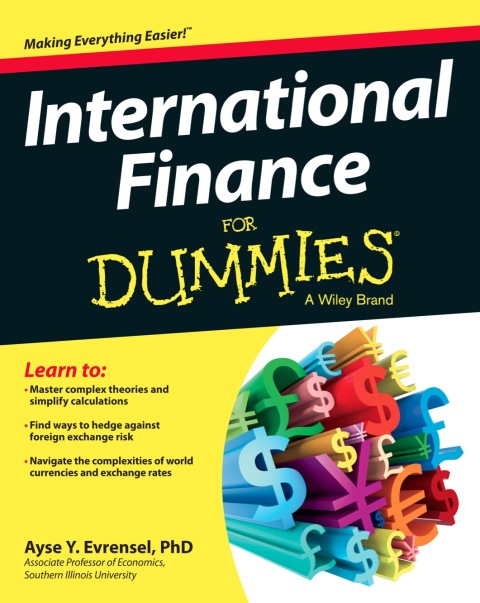Description
Efnisyfirlit
- About the Author
- Contents at a Glance
- Table of Contents
- Introduction
- About This Book
- Conventions Used in This Book
- What You Are Not to Read
- Foolish Assumptions
- How This Book Is Organized
- Icons Used in This Book
- Where to Go from Here
- Part I: Getting Started with International Finance
- Chapter 1: Money Makes the World Go ’Round
- Checking Out Definitions and Calculations
- Finding Out What Determines (Or Changes) Exchange Rates
- Getting to the Long and Short of It
- Answering Questions about the System: Fixed, Flexible, or Pegged?
- Gaining Insight into the Do’s and Don’ts of International Finance
- Looking at Finance Globally
- Chapter 2: Mastering the Basics of International Finance
- Making the Exchange: Exchange Rates
- Taking on Different Exchange Rates
- Tackling Terminology: Changes in Exchange Rates
- Grasping Exchange Rate Conversions
- Calculating Cross Rates
- Figuring the Bid–Ask Spread
- Chapter 3: Buy, Sell, Risk! Users of Foreign Exchange Markets
- Identifying Major Actors in Foreign Exchange Markets
- Watching Out for Risk
- Speculation: Taking a Risk to Gain Profit
- Chapter 4: It’s All about Change: Changes in the Exchange Rate
- Considering a Visual Approach to Changes in Exchange Rates
- Looking at How Macroeconomic Variables Affect Exchange Rates
- Uncovering Hidden Information in Graphs: Exchange Rate Regimes
- Part II: Determining the Exchange Rate
- Chapter 5: It’s a Matter of Demand and Supply
- Apples per Orange, Euros per Dollar: It’s All the Same
- Determining Exchange Rates through Supply and Demand
- Predicting Changes in the Euro–Dollar Exchange Rate
- Keeping It Straight: Using a Different Exchange Rate
- Chapter 6: Setting Up the Monetary Approach to Balance of Payments
- Discovering the MBOP’s Approach to Exchange Rates
- Explaining the Money Market
- Taking On the Foreign Exchange Market
- Combining the Money Market with the Foreign Exchange Market
- Keeping It Straight: What Happens When You Use a Different Exchange Rate?
- Chapter 7: Predicting Changes in Exchange Rates Based on the MBOP
- Applying Real Shocks to MBOP
- Applying Nominal Shocks to MBOP
- Keeping It Straight: What Happens When We Use a Different Exchange Rate?
- Comparing Predictions of MBOP and the Demand–Supply Model
- Part III: Understanding Long-Term Concepts and Short-Term Risks
- Chapter 8: Your Best Guess: The Interest Rate Parity (IRP)
- Tackling the Basics of Interest Rate Parity (IRP)
- Working with the IRP
- Speculation Using the Covered Interest Arbitrage
- Determining Whether the IRP Holds
- Chapter 9: Taking a Bite Out of the Purchasing Power Parity (PPP)
- Getting a Primer on the Purchasing Power Parity (PPP)
- Working with the PPP
- Deciding Whether the PPP Holds
- Chapter 10: Minimizing the FX Risk: FX Derivatives
- Checking Out FX Derivatives
- Moving to Forward Contracts
- Looking at Futures Contracts
- Just Say “No” to Obligation! Looking at Options
- Part IV: Conducting a Background Check: Changes in Currency through the Years
- Chapter 11: Macroeconomics of Monetary Systems and the Pre-Bretton Woods Era
- Reviewing Types of Money through the Ages
- Examining the Relationship between Types of Money and Exchange Rate Regimes
- Understanding the Macroeconomics of the Metallic Standard
- Discovering the Monetary System of the Pre–Bretton Woods Era
- Chapter 12: Bretton Woods Era (1944–1973)
- Gaining Insight into the Bretton Woods System
- Attending the Bretton Woods Conference in 1944
- Judging the Outcome of the Bretton Woods Conference
- Marking the Decline of the Bretton Woods System
- Chapter 13: Exchange Rate Regimes in the Post–Bretton Woods Era
- Using Floating Exchange Rates
- Unilaterally Pegged Exchange Rates
- Dealing with Currency Crises and the IMF
- Mirror, Mirror: Deciding Which International Monetary System Is Better
- Chapter 14: The Euro: A Study in Common Currency
- Introducing the Euro
- Walking the Stages of European Monetary Integration
- Getting the Lowdown: Euro’s Report Card
- Finding What the Future Holds for the Euro
- Part V: The Part of Tens
- Chapter 15: Ten Important Points to Remember about International Finance
- Catching Up on What a Relative Price Is
- Finding Out What Makes a Currency Depreciate
- Keeping in Mind That Higher Nominal Interest Rates Imply Higher Inflation Rates
- Paying Attention to Interest Rate Differentials When Investing in Foreign Debt Securities
- Uncovering the Two Parts of Returns When Investing in Foreign Debt Securities
- Adjusting Your Expectations As Information Changes
- Appreciating the Size of Foreign Exchange Markets
- Using Foreign Exchange Derivatives for the Right Reason
- Noting That Going Back to the Gold Standard Means Dealing with Fixed Exchange Rates
- Realizing the Value of Policy Coordination in a Common Currency
- Chapter 16: Ten Common Myths in International Finance
- Expecting to Make Big Bucks Every Time You Speculate in Foreign Exchange Markets
- Thinking You Can Buy a Big Mac in Paris at the Same Price as in Your Hometown
- Ignoring Policymakers When It Comes to Exchange Rates
- Giving Up on Theory Too Easily
- Forgetting about High Short-Term Volatility in Exchange Rates
- Thinking that All Changes in the Exchange Rate Are Traceable to Changes in Fundamentals
- Thinking about Foreign Exchange Markets as Just Another Market
- Assuming that Central Bank Interventions Are Meaningless
- Thinking that Pegged Exchange Rates Are a Great Idea
- Being Nostalgic about the Good Old Gold Standard Days
- Appendix: Famous Puzzles in International Finance
- The Home Bias in Trade Puzzle
- The Home Bias in Equity Puzzle
- The Feldstein–Horioka Puzzle
- The Consumption Correlation Puzzle
- The Exchange Rate Disconnect Puzzle
- The Purchasing Power Puzzle
- Market Imperfection Explanations for Exchange Rate Puzzles
- Index





